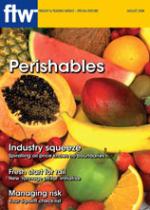SOUTH AFRICA’S cold storage and attendant facilities
are nowhere near like two peas in a pod, hence the
need for a varied, region-by-region, approach, suggests
Mmachidi Thobejane, FPT’s newly-appointed group
business development manager.
Amid assertions by a senior fruit industry source
that the country is losing a small fortune due to
insufficient cold storage capacity, Thobejane – fresh
from a Gallagher Estate workshop where the issue
was on the table – tells FTW one needs to look at a
combination of two factors to arrive at an answer.
From the perspective of the hardier citrus fruit,
she points out, one needs to look at the “dwell time”
that it takes to get the fruit down to the required
temperature for shipment.
“Provided there are sufficient shipping
opportunities, the current cold storage capacity is
sufficient. It is about the efficiency of the industry in
matching the weekly demand for shipment with the
weekly availability of shipping space.”
The second factor, she believes, is that some
areas are less blessed with cold storage and aligned
facilities. In Port Elizabeth, for example, there are only
about 500 reefer plug points, insufficient to serve the
province’s export fruit needs.
Coega will in the long run provide a solution to the
Eastern Cape region, once it is fully operational.
Cape Town, on the other hand, has 2 250 plug
points and is therefore well positioned to meet export
requirements.
“So what we see is that there is a lack of shipping
opportunities as well as landside infrastructure
constraints in certain regions for the container mode,
all of which results in a perception that there are cold
storage capacity constraints. The capital expense of
increasing capacity in cold storage will not address
the dilemma of dwell time as one will only have more
product in stock, which therefore adds cost to the
logistics chain.”
Containerised fruit has moved further ahead of
specialised reefer services (conventional) shipping
this year but FPT is becoming increasingly involved
with containers on top of its commanding position
in specialised reefer services, fruit still its largest
commodity.
Johannesburg-born and raised Thobejane, a Sepedi
whose parents came from Polokwane in Limpopo
province, started her career as a management trainee
with Anglo American in 1999.
She has a B Com degree with majors in finance
information systems and accounting and aside from
other qualifications obtained since, is working toward
an honours degree in supply chain management.
Prior to joining FPT, Thobejane was, for 2.5 years, in
charge of supply chain process management at Mondi,
in Durban, during which time she also spent eight
months looking at setting up a warehouse operation
in the port of Richards Bay.
Shipping opportunities determine adequacy of cold store capacity
15 Aug 2008 - by Ray Smuts
0 Comments
Perishables 2008

15 Aug 2008
15 Aug 2008
15 Aug 2008
15 Aug 2008
Border Beat
Featured Jobs
New
New
New
New
New
